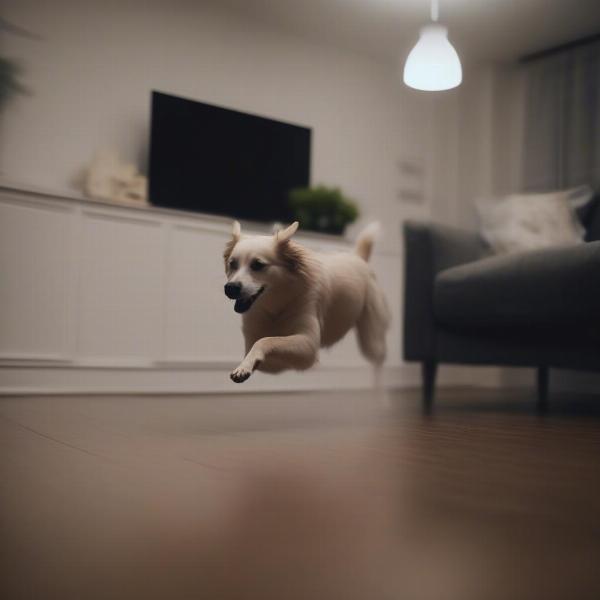The “dog vs. werewolf” meme is a popular internet phenomenon that humorously compares the stark difference between a dog’s daytime demeanor and their nighttime antics. Often, these memes depict a sweet, innocent-looking dog during the day transforming into a mischievous, wild creature at night, resembling a werewolf. This resonates with many dog owners who have experienced their furry friend’s sudden shift in personality once the sun goes down. But beyond the humor, what does this meme really tell us about dog behavior? Let’s dive deeper into the playful parallels between our canine companions and the mythical werewolf.
From Fluffy Friend to Midnight Monster: Understanding the Humor
The core of the dog vs. werewolf meme lies in its relatable depiction of a dog’s dual nature. By day, they’re often cuddly, calm companions, happy to nap and receive affection. But come nightfall, some dogs seem to tap into a hidden reservoir of energy, exhibiting behaviors that range from playful zoomies to mysterious howls. This sudden shift is often exaggerated in the meme, portraying dogs as transforming into full-fledged werewolves, complete with glowing eyes and sharp claws. This humorous exaggeration perfectly captures the surprise and sometimes bewilderment that dog owners experience when their well-behaved pet suddenly embraces their inner wild child.
The Science Behind the Shift: Why Do Dogs Act Differently at Night?
While the transformation depicted in the meme is obviously fictional, there are scientific explanations for why some dogs exhibit more energetic or unusual behaviors at night. One factor is their natural circadian rhythm. Just like humans, dogs have an internal clock that regulates their sleep-wake cycle. Some breeds are naturally more crepuscular, meaning they are most active during dawn and dusk. This can lead to increased activity levels as the sun sets. Another contributing factor is simply boredom. If a dog hasn’t received enough physical exercise or mental stimulation during the day, they may be more likely to engage in attention-seeking behaviors at night.
 Dog Zoomies at Night
Dog Zoomies at Night
Taming the Inner Werewolf: Tips for Managing Nighttime Behavior
If your dog’s nighttime antics are causing disruption, there are several things you can do to help manage their behavior. Ensuring they get plenty of exercise and mental stimulation throughout the day is crucial. A tired dog is a well-behaved dog. Establishing a consistent bedtime routine can also help regulate their circadian rhythm and promote better sleep. This could include a calming activity like a gentle massage or a quiet play session before bedtime. Finally, providing them with interactive toys or puzzle feeders can help keep them occupied and prevent boredom.
Conclusion: Embracing the Playful Side of the Meme
The dog vs. werewolf meme offers a lighthearted take on the often unpredictable nature of our canine companions. While the transformation into a werewolf is pure fantasy, the meme highlights the real behavioral shifts that many dogs experience at night. By understanding the factors contributing to these changes, we can better manage our dogs’ nighttime behavior and appreciate the humor in their sometimes wild antics. So, the next time your furry friend starts acting a little too “werewolf-like,” remember the meme and embrace the playful side of their dual nature.
FAQs:
- Do all dogs experience this nighttime behavior change? No, not all dogs exhibit significant changes in behavior at night. It depends on factors like breed, age, individual personality, and daily routine.
- Is it normal for my dog to howl at night? Howling can be a normal form of canine communication, but excessive howling might indicate boredom, anxiety, or a medical issue.
- How can I prevent my dog from getting the “zoomies” at night? Ensuring they get enough exercise during the day and having a calming bedtime routine can help reduce nighttime hyperactivity.
- What are some good nighttime activities for my dog? Puzzle toys, chew toys, and gentle massage can help keep your dog occupied and relaxed before bedtime.
- Should I be concerned if my dog’s nighttime behavior suddenly changes? A sudden and significant change in behavior could indicate an underlying health issue, so it’s best to consult with a veterinarian.
ILM Dog: Your Trusted Partner in Canine Care
ILM Dog is your go-to resource for all things dog-related. We provide expert advice and practical information on everything from breed selection and puppy care to senior dog health and training. Our mission is to empower dog owners worldwide with the knowledge and resources they need to provide the best possible care for their beloved companions. Whether you’re a seasoned dog owner or just starting your journey, ILM Dog is here to support you every step of the way. Contact us at [email protected] or +44 20-3965-8624 for personalized guidance and expert advice.